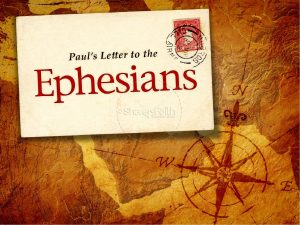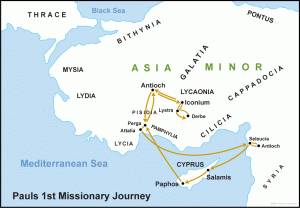
Ephesians 1:1-2
Do you know who you are?
The contemporary business culture loves to analyze and categorize people based on surveys and questionnaires. There is a huge industry that has evolved simply around the concept of profiling and the analysis of personalities. However, you can go through all the programs and personality profiles you like, you can be placed in fifteen different categories, but ultimately your identity, your real self can only be found in Christ Jesus and who he created you to be.
The Apostle Paul wrote a letter to the churches in Ephesus around A.D. 62, and the primary focus of the letter is our identity, who we are in Christ.
This book is only six chapters that will take about 20 minutes to read aloud. But it is one of the most influential and practical books in the Bible.
Unfortunately, we live in an age, particularly in the western church where we have a very superficial, cultural Christianity. This book will make us think and challenge us by what the Apostle Paul calls, “the unsearchable riches of Christ” (Eph. 3:8)
This book is extremely practical, for example, through these six chapters we learn:
- Why we worship.
- What we should pray for.
- We learn about the incredible gift of God’s grace.
- We learn about our identity in Christ.
- We learn why the church is really important.
- We learn how we can be unified as a church.
- The letter to the Ephesian church teaches us about marriage, parenting and our careers.
- And finally, as we come to the last chapter, we learn about the war we are engaged in and how we are to fight.
The Apostle Paul was the former persecutor of the church who had a dramatic conversion experience as he encountered Jesus on the road to Damascus. He was radically changed; he received a new identity because he knew what Jesus has done for him.
The letter begins in verse 1, “Paul, an apostle of Christ Jesus by the will of God”
Paul knew he was an apostle, someone who was sent and commissioned by Jesus.
Notice he says, “by the will of God”, not of his own choosing, and along with that came the responsibility to proclaim the Gospel and to suffer for the Gospel.
The recipients of this letter are the church in Ephesus. Ephesians 1:1b, “To the saints who are in Ephesus, and are faithful in Christ Jesus:”
It is quite likely this letter was meant for the entire region; hence it is general and does not call out specific people or false teachers as his other letters do. We read about Paul’s ministry in Ephesus in Acts 19. Paul came to the region of Ephesus in Asia Minor (Modern Turkey) and stayed in Ephesus for about three years during his third missionary journey, the longest he stayed in any city while on his missionary journeys. Ephesus was a large city, possibly the 4th or 5th largest city in the world at that time.
But his ministry was not without difficulties. Because of his teaching, there was fierce opposition from idol manufacturers who made a living out of making silver idols for the people to buy.
Here is something to note as we remember Paul writing this letter while in chains. Just because there is opposition it does not mean that you are outside the will of God. The plan of God for your life and mine does not include freedom from opposition. In fact, opposition is very often the opportunity to give glory to God in the midst of the challenge.
Ephesus was also the headquarters of the cult that worshipped the Roman goddess Diana and the Gospel threatened the trade of idols. Paul confronted this warfare head-on and in Acts 19, we read of the account of the seven sons of Sceva who were beaten and stripped by a demon possessed man. These sons of Sceva brought glory to Jesus through their humiliation and many burned their magic books and turned to Christ (see Acts 19:20).
The result of Paul’s preaching was a city-wide disturbance. Are we creating a holy disturbance in our city?
Paul writes this letter to believers who needed to be reminded of the warfare they were engaged in. We too need to be reminded that this world is not our home and we will encounter things and see things that deeply trouble us and offend us, if we aren’t aware of our true identity.
You see, in our western educated mindset, we compartmentalize our Christian Spiritual experience and then our American life experience. But as followers of Jesus we are not of this world. If we are people who have truly given our lives to the Lordship of Jesus Christ, then we have a new identity and that is what this entire book of 155 verses is all about.
Paul has a term that is used in the first verse that explains it all, “To the saints who are in Ephesus, and are faithful in Christ Jesus”
While the believers in Ephesus lived in Ephesus, they were spiritually IN CHRIST.
That term in Christ has intrigued me for years and I don’t think we will ever fully understand the incredible blessing that it brings to us.
Paul uses the term “IN CHRIST” about 164 times in all his letters, and 36 times alone in this letter to the Ephesians.
To be IN CHRIST, is the heart of Christianity.
As we look through Ephesians, we will see:
- IN CHRIST, we have access to every spiritual blessing.
- IN CHRIST, his riches are our riches.
- IN CHRIST, his resources are our resources.
- IN CHRIST, his righteousness becomes our righteousness.
- IN CHRIST, his power is our power.
- IN CHRIST, his position is our position.
- IN CHRIST, where he is, we are.
Even though you may encounter opposition on every side, we are secure in him. We have our identity in Jesus Christ.
Our identity has nothing to do with our performance, popularity or our productivity, we have everything, because we are “IN CHRIST”.
Christianity, being a follower of Jesus is not religion. It’s not about becoming a nice person who follows a set of rules, becoming a Christian is about becoming a new person.
Steve Timmis wrote in Total Church, “It is not that I belong to God and then make a decision to join a church. My being in Christ means being with others who are in Christ. This is my identity… If the church is the body of Christ, then we should not live as disembodied Christians.”




